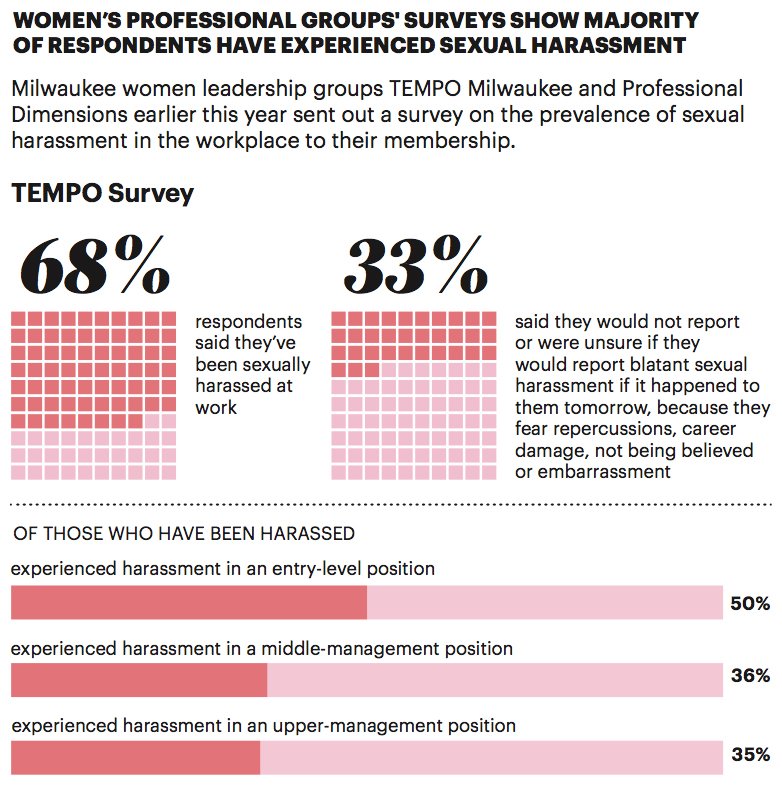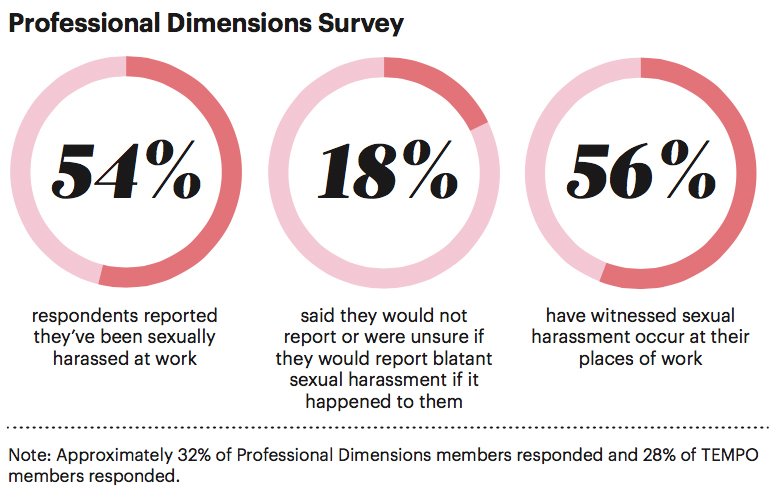Me too.
It's a short phrase, but perhaps no statement in recent times has packed the punch, conveyed so much and impacted such change — especially in the first few months of 2018 — as those two meager, single-syllable words.
As the viral social media movement has unfurled throughout the internet and shocking revelations of rampant sexual misconduct have come to light thanks to #MeToo, the campaign’s effects have been numerous and far-reaching.
While Hollywood has been forced to take a critical look at how it treats women in the film industry, small businesses and global corporations have had to do the same. Numerous prominent media figures have been ousted due to allegations of abuse. And many victims of sexual harassment and assault are now more emboldened to speak out than before.
And in the case of Milwaukee-based Beyond Vision, it is the #MeToo era — and the news stories that spiraled out of it— that spurred the organization to proactively take a fresh look at its policies and evaluate whether it was doing the maximum to create a culture where sexual harassment was unwelcome.
“It really drove us and our leadership team to make sure we were taking proactive steps so our leaders, our managers and our employees have the tools to recognize when something like (harassment) happens, what to do when something like (harassment) happens and, most importantly, try to prevent (harassment) from ever happening,” said Rob Buettner, senior director of relationships and business services.

After reviewing its practices and systems several months ago, the 501(c)3 nonprofit — which already had a policy in place to address the issue — decided it was time for a refresh. The organization, which has 80 employees and provides opportunities for sustainable employment to individuals who are blind, is in the midst of instituting new sexual harassment training for all employees and is updating the training materials new workers interact with during the orientation process.
“If it can happen at an NBC or it can happen at an Uber, it can happen anywhere and we can’t take for granted that our employees know this information, we need to make sure they have that information,” he said.
In the wake of the #MeToo movement, Beyond Vision is an example of a Milwaukee employer making strides to address sexual harassment in the workplace. According to local human resources organizations and law firms with Milwaukee clients, Beyond Vision isn’t the only one.
Lawyers and human resource professionals interviewed for this story say the #MeToo movement has prompted some Milwaukee-area employers and businesses to take a renewed look at how they approach sexual harassment at work, with some organizations dusting off their company handbooks and rejiggering their approach to the issue.
“Nationally, as well as locally, the #MeToo movement has caused businesses to take a step back and evaluate: ‘Are we promoting a professional work environment?’ And I think, more often than not, the desire is there to have a respectful work environment — a professional work environment,” said Rebeca Lopez, attorney at Godfrey Kahn SC, whose specialties include consulting companies on workplace training. “But I think a lot of businesses are taking the time now to ask, ‘Are we doing everything we can in the wake of these allegations?’ For some it’s an awakening.”
Pervasive problem
While incidents of sexual harassment in the news and film industries have been meticulously documented by the media, it’s an issue that’s not isolated to faraway places like Hollywood and New York City.

Recent surveys conducted by local women leadership groups like Professional Dimensions and TEMPO Milwaukee reveal that many local working women with varying backgrounds have experienced sexual harassment in the workplace. Women responding to those surveys described being subject to indecent touching, inappropriate, sexually charged comments and persistent, unwelcome sexual advances, among other distressing incidents.
“Milwaukee is not immune to sexual harassment,” said Jen Dirks, president and CEO at TEMPO.
In a survey that yielded responses from nearly 28 percent of its membership, TEMPO found that 68 percent of respondents had experienced sexual harassment at work. Professional Dimensions sent out a similar survey to its membership, with 32 percent responding, and found that 54 percent reported experiencing sexual harassment at work.
In Milwaukee, like elsewhere, women are speaking out.
“We’ve seen an uptick in the number of women who are coming to us and seeking legal advice and that’s at least, in part, due to the fact they’ve gained courage because of the (#MeToo) reporting that has been going on,” said Barbara Zack Quindel, a labor attorney for Hawks Quindel SC’s Milwaukee office.
How companies are responding
As the #MeToo impact trickles down to the local level, area employers have been turning to legal counsel and human resources organizations to better understand how the movement could affect their workplaces. Attorneys and human resources professionals say many organizations are seeking out new methods and enhanced programs to preemptively guard against harassment in their work environments.
Waukesha-based trade association MRA-The Management Association has diligently been helping members evaluate their harassment policies since #MeToo picked up steam last fall. Use of the company’s third-party investigation line — a common recourse to resolve harassment issues in the workplace — has increased 100 percent for the first fiscal quarter of 2018 compared with the same period last year, said Laurie Greenlees, MRA's human resources director.
“A lot of the employers already have a lot of good policies and procedures and training in place, but they certainly want to make sure that all of their policies and training are correct, relevant and addressing the concerns that are being raised through the #MeToo movement,” Greenlees said.
In some scenarios, Greenlees said, local employers are looking to brush up their harassment policies or take their training a step further by increasing its frequency or becoming more detailed so employees learn what specific behavior constitutes harassment.
Such was the case with Lakeside Manufacturing Inc., of West Milwaukee. As #MeToo gained momentum, the company established a dialogue about the movement with managers, and reviewed and upgraded its regular harassment prevention training for its more than 145 staff members. The company brought in MRA to help evaluate its needs as a company, said Kari Niepow, the firm's director of human resources.
Lakeside's new training, set to roll out to all employees in the near future, is designed in a fashion that's more tailored and interactive.
"We do yearly training anyway, but this year we decided to step back from the traditional way of doing it," Niepow said.
With the new training, Niepow said the goal is to deepen employees' understanding of what qualifies as harassment and preventive measures. The company also wants to ensure it goes "beyond just checking the box" of being compliant and mandating harassment training for all workers, she said.

Establishing a zero-tolerance policy for those employees who act in a retaliatory fashion after a colleague reports incidents of abuse or harassment is also an increasingly common route taken by Milwaukee employers in the #MeToo era, said Greenlees.
“You're now seeing employers shift gears and institute annual training, so they're not just doing it as part of the new employee training process, they're really building it into their workplace,” she said.
Specific training for c-suite executives has also become markedly more prevalent as workplaces recognize that high-level leaders set the tone for an organization’s culture.
“Before (companies) were worried more about — for a lack of better word — the rank-and-file staff; now they realize it’s top to bottom,” said attorney Denise Greathouse at Milwaukee law firm Michael Best & Friedrich LLP, which has been hosting thought leadership sessions on #MeToo for clients. “That has changed drastically due to the #MeToo movement.”
Many allegations brought to light through #MeToo have centered around individuals who hold high-level positions within an organization.
“In the wake of #MeToo, we’ve seen an increase, both national and locally, for specific training for the c-suite,” Lopez said, “because when you look at all the articles that have come out, this is really a movement that has a focus on the top and the leadership of workplaces.”
Locally, Greathouse said she’s observed that, following the #MeToo movement, Milwaukee-area firms are transitioning some of their employee education on harassment from an online format to one that is conducted in-person by a third party.


Some Milwaukee-area companies, however, find their current training and policies hold steady and don’t need reworking. Several firms contacted for this story acknowledged the #MeToo movement has had no impact on how they conduct their business or handle human resources; they find their current policies and stance on sexual harassment already sufficient enough.
Steve Stall, diversity and inclusion manager at Rockwell Automation Inc. in Milwaukee, said #MeToo hasn’t directly led to any momentous policy shift for the manufacturer, but has helped inform the company as it crafts new programs and initiatives to prevent harassment and create a safer workplace. For instance, #MeToo has informed a bystander intervention training program the company has crafted with Marquette University.
As the movement has burgeoned, the company, which has nearly 3,000 local employees and about 22,000 companywide, has rehashed information to employees about the types of anti-harassment resources readily available to Rockwell staff, he said.
“It became important for us to communicate to our women and our leaders in this organization of what we’re doing,” Stall said.
New dialogue
Woven into discussions about workplace harassment is the sentiment that, in the #MeToo era, employers must go beyond just drafting up a new page for the company handbook or mandating employees aimlessly participate in a webinar.
Multiple attorneys and individuals interviewed for this story said there’s a heightened awareness among many employers that solely adhering to what’s required by the law isn’t going to cut it anymore.
“We know that reporting it, confronting somebody and putting a policy in place is important, but it’s not enough,” said Johannah Karstedt St. John, director at Professional Dimensions. “Because those things, at a lot of companies, are already happening and change is not occurring.”
“Employers in and around the Milwaukee area are absolutely looking to update their policies and revamp their training procedures due to the #MeToo movement,” said Greathouse. “They are now recognizing that the legal compliance is not enough any longer. Before there was the perception that as long as you had that policy in place, it was considered that everything is being done appropriately at the workplace.”
More than ever, Greathouse said the #MeToo movement has placed a spotlight on the role of workplace culture in the pervasiveness of sexual harassment. If the workplace culture doesn’t align with the rules written in the handbook, harassment will continue to persist.
“Training and revising your policies are great, it’s a great step,” Greathouse said. “But if you don’t review what the culture is like and address the culture situation, then six months after that training, the same stuff will go on.”